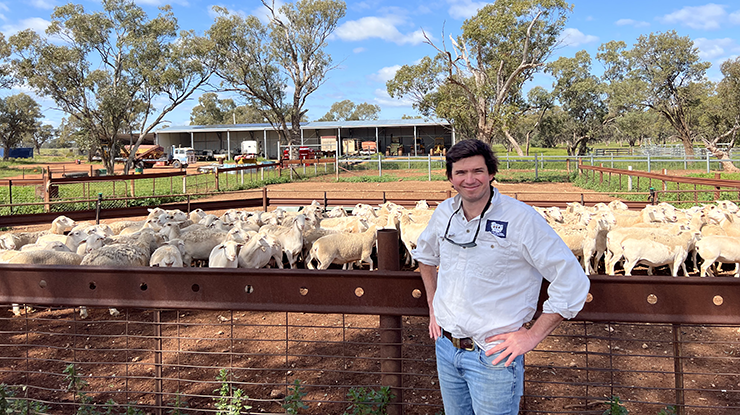
While working across Australia and the world, veterinarian Tim Gole (pictured) saw a gap in his trade – specialised services for commercial sheep producers.
Now, his consultancy business For Flock’s Sake has clients from Blackall to Bendigo – all with the hope that he can unlock their enterprises’ full potential.
From his experience consulting with sheep producers, Tim has a few tips on how southern flocks can maximise success this spring. Here are his top hints and tricks.
Preparing for success
When it comes to managing sheep for maximum productivity, Tim said some of the key focuses for producers should include:
- understanding your weaning process and the needs of weaners
- knowing which sheep within your flock are most at risk of spring-enhanced issues (such as flystrike)
- ensuring your paddocks are free from contamination – particularly worm eggs
- completing educational courses such as a lifetime ewe management course to get the best out of your flock.
Particularly, getting educated on best practice management was something Tim said is essential.
“I think every sheep producer should do a lifetime ewe management course,” Tim said.
“There are so many things in our business we can’t control, but what is 100% controllable is our level of education.
“People say they can’t spend that time off-farm, but what does it cost you in the long run to stay on-farm and not get that knowledge?”
Be wary of worms
Tim said worm burdens are something to watch closely this spring, with uncharacteristic seasons affecting the soils within southern enterprises.
“We tend to view black scour, brown stomach and Barber’s Pole worms as either summer or winter worms, but the traditional climatic operating conditions have changed and overlapped due to the wet weather,” Tim said.
“Producers need to be aware of how that’s affecting worm populations both within the animal and paddock larval levels.”
According to Tim, the best action to prevent high worm burden is to continue testings of:
- faecal egg counts (FECs)
- larval differentiation tests
- faecal egg count reduction tests
- recording egg numbers from paddocks.
Conducting faecal egg reduction tests two weeks after drenching will confirm worm kill rates to assist in assessing drench effectiveness. Recording FECs from paddocks will also help producers plan paddock rotations, ensuring that sheep are not re-contaminated from still-intact eggs.
The role of consultants and vets
Tim also notes the importance of seeking out advice from your local veterinarian.
“There are a lot of veterinarians who are so keen to help producers.”
“We believe better interactions with the sheep industry and vets will create better long terms strategic benefits for our animals, producers and ultimately our consumers who are looking for assurance and confidence in our sheep production systems.”
Based in Dubbo, Tim’s veterinary consultancy For Flock’s Sake provides services including:
- designing structured systems for maintaining sheep health
- providing proactive advice to meet nutritional needs
- sheep AI services and conducting genetic audits through flock profiles to analyse genetic gains to suit individual enterprises
- data collection through commercial electronic identification technology
“The business really revolves around three main pillars – health, genetics and data,” Tim said.
“Once you can nail those, your flock are able to execute their full genetic potential and maintain profitable production.
“The purpose of this business is to help producers raise their best sheep and make every ewe a winner. All our services are aimed at trying to make any of these complex biological systems into something easy and relatable for commercial producers.”








